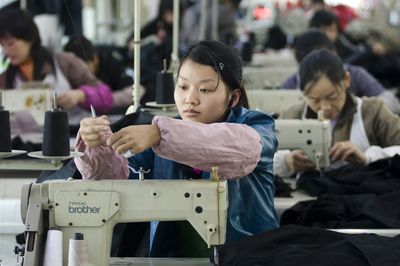China’s economy pinched by slowdown in exports
Toy companies closing in droves in China

WASHINGTON – Sharply lower consumer spending in the United States and other high-income countries is stalling global trade, causing a surprise downturn in exports from China that is dramatically slowing its economy and rippling through other countries that rely on international commerce.
With recessions hitting the United States, Europe and Japan at the same time, China on Wednesday said that its November exports took their biggest dive in seven years. Weak holiday spending is taking a particularly hard toll on toymakers: Two-thirds of China’s small-toy exporters closed in the first nine months of 2008, according to government statistics.
At the same time, tight credit and falling global demand are setting off the first decline in world trade in a quarter century, touching off a wave of job losses in rich and poor countries alike.
The drop in trade is both sharper and faster than many analysts had predicted only weeks ago, with freight lines that were sailing full this summer now slashing prices by as much as 90 percent as cargo traffic plummets and unsold goods pile up at ports from Baltimore to Shanghai.
The World Bank this week said global trade is set to fall by 2.1 percent in 2009, marking the first decline since 1982. The drop is contributing to a more dire outlook for the world economy, which the World Bank said is close to falling into a global recession.
The slowdown illustrates how globalization, which fed rapid growth during times of plenty, can quickly turn against nations during times of bust. Depressed car sales in the United States, for instance, are spreading through the global supply chain, eliminating jobs for contract auto workers in Japan and laborers in South Africa who mine the metals used in car parts.
The impact on China, one of the rare lights in an otherwise gloomy global economy, is particularly troubling. Beijing announced Wednesday that its November exports dropped 2.2 percent after a 19.2 percent surge in October. Imports took an even steeper drop, falling 17.9 percent. Analysts now say growth there is slowing to its lowest level since 1990, curbing Chinese demand.
That is bad news for the United States and other high-income countries that were counting on sales to China and other developing countries to help combat recessions at home. Earlier this year, an array of U.S. exports including Boeing jets and Caterpillar tractors were at least partially offsetting weak domestic demand. U.S. trade data to be released today is expected to show another jump in October exports. But analysts say those numbers do not reflect industry estimates that U.S. exports reversed course in November as the financial crisis deepened worldwide.
“You can essentially say the U.S. export boom is over,” said Brian Bethune, chief U.S. economist for IHS Global Insight.
In recent weeks, the World Bank has had to step in with loans to exporters in developing countries because the global credit crunch dried up short-term trade financing needed to ship goods overseas.
Many nations such as China are turning to government spending programs, such as building new bridges and dams, to keep their economies growing. But the effect of such spending could take months to be felt in the real economy.
The government in Beijing has taken aggressive measures to try to spur trade, such as re-introducing tax rebates for exports and helping banks increase lending.
But they have thus far failed. At the same time, efforts to tap the domestic market in emerging nations are proving to be difficult. November car sales were down 37 percent in the U.S., but they were also down by 10 percent in China, according to the World Bank.